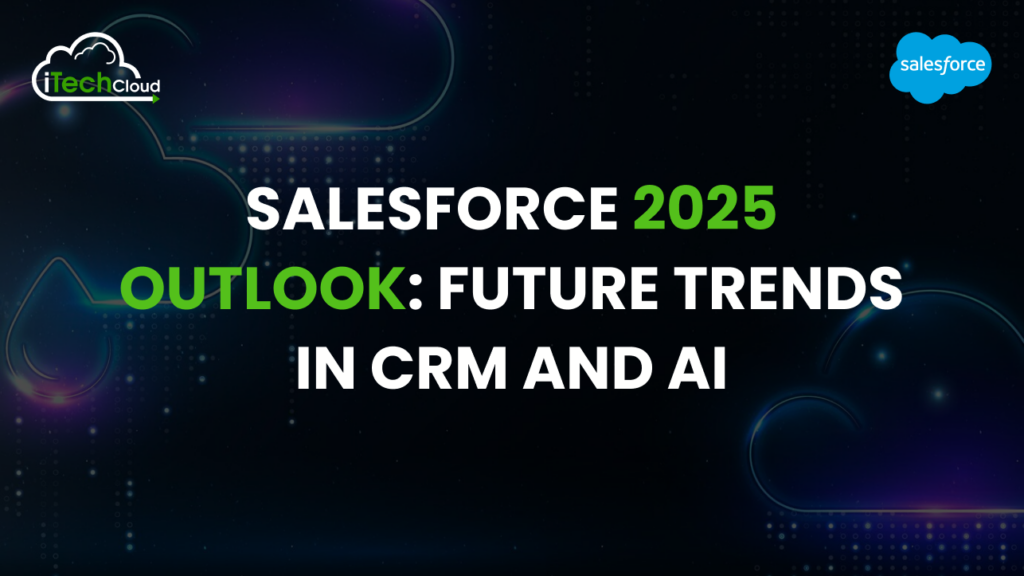Salesforce 2025 Outlook: Future Trends in CRM and AI

The evolving landscape of customer relationship management (CRM) has been consistently shaped by technological advancements. Salesforce, as a market leader in CRM, continues to be at the forefront of this evolution. By integrating artificial intelligence (AI) and other innovative technologies, Salesforce is redefining how businesses manage customer relationships.
Table of Contents
The key Salesforce 2025 Outlook.
1. AI-Driven CRM for Customer Experience
Artificial intelligence will continue to dominate the Salesforce ecosystem, driving smarter and more personalized customer interactions. Salesforce Einstein, the AI platform integrated into Salesforce, is expected to evolve further, offering advanced predictive analytics, real-time data insights, and hyper-personalized recommendations. In 2025, businesses will leverage AI-powered tools to anticipate customer needs, automate repetitive tasks, and enhance decision-making.
Key advancements include:
- Predictive Analytics: Identifying trends and predicting customer behavior with greater accuracy.
- Conversational AI: Customer interactions through AI-driven chatbots and voice assistants.
- Sentiment Analysis: Understanding customer emotions to tailor responses and improve satisfaction.
2. Hyperautomation in CRM
Hyperautomation involves using AI, machine learning (ML), and robotic process automation (RPA) to streamline workflows and eliminate manual processes. Salesforce will likely lead this trend by providing robust automation capabilities to its users. Features such as automated lead scoring, workflow orchestration, and customer journey mapping will become more sophisticated, enabling businesses to achieve greater efficiency.
In 2025, hyperautomation will empower businesses to:
- Accelerate sales processes.
- Reduce operational costs.
- Deliver seamless customer experiences.
3. Integration of IoT and CRM
The Internet of Things (IoT) is becoming an integral part of the CRM landscape. By 2025, Salesforce will likely strengthen its IoT Cloud platform to capture and analyze data from connected devices. This integration will enable businesses to gain real-time insights into customer behavior and product performance.
Potential use cases include:
- Proactive maintenance for IoT-enabled products.
- Real-time alerts and notifications.
- Personalization through contextual data.
4. Data Privacy and Ethical AI
As businesses collect and process vast amounts of customer data, ensuring privacy and ethical AI usage will be critical. Salesforce is expected to focus on building transparent AI models and adhering to global data protection regulations such as GDPR and CCPA. By prioritizing ethical AI and robust data privacy measures, Salesforce will help businesses build trust with their customers.
5. Focus on Industry-Specific Solutions
Salesforce has been expanding its portfolio of industry-specific solutions, and this trend will continue in 2025. By offering tailored CRM solutions for healthcare, financial services, retail, and other industries, Salesforce will enable businesses to address unique challenges and deliver superior customer experiences.
Highlights include:
- Custom workflows and dashboards.
- Industry-specific AI models.
- Compliance and regulatory support.
6. Sustainability in CRM
Sustainability will play a significant role in shaping CRM strategies in 2025. Salesforce’s Net Zero Cloud is a prime example of how businesses can track and reduce their carbon footprints. By integrating sustainability into CRM, companies can align with their customers’ values and contribute to global environmental goals.
7. Multi-Channel and Omnichannel Experiences
In 2025, delivering consistent experiences across multiple channels will be non-negotiable. Salesforce’s omnichannel capabilities will enable businesses to interact with customers seamlessly across social media, email, chat, and other platforms. Real-time data synchronization and advanced analytics will ensure that customers receive personalized experiences regardless of the channel.
8. Democratization of AI and CRM
Salesforce is expected to make AI and advanced CRM capabilities more accessible to businesses of all sizes. With tools like low-code and no-code platforms, businesses can easily customize and deploy solutions without requiring extensive technical expertise. This democratization will drive innovation and adoption across industries.
9. Customer Data Platforms (CDPs) for Unified Data
Customer Data Platforms (CDPs) will gain prominence in the Salesforce ecosystem. By consolidating data from various touchpoints, CDPs will provide businesses with a unified view of their customers. This holistic approach will enable better segmentation, targeting, and personalization.
10. Augmented Reality (AR) and Virtual Reality (VR) in CRM
The integration of AR and VR technologies will redefine customer engagement. Salesforce is likely to explore these immersive technologies to enhance training, product demonstrations, and customer support. For instance, AR/VR tools could enable virtual product walkthroughs or immersive troubleshooting experiences.
11. Blockchain for Secure CRM
Blockchain technology is poised to revolutionize data security in CRM. By leveraging blockchain, Salesforce can provide businesses with tamper-proof records, ensuring transparency and trust. Key applications include secure identity management, contract verification, and data sharing.
12. Upskilling and Reskilling for the Salesforce Ecosystem
As Salesforce technologies evolve, the demand for skilled professionals will increase. Businesses will invest in upskilling and reskilling their workforce to keep pace with the latest advancements. Salesforce’s Trailhead platform will play a crucial role in empowering individuals and organizations to acquire new skills and certifications.
Summary
Salesforce outlook 2025 is defined by innovation, customer-centricity, and a commitment to ethical practices. By embracing AI, hyperautomation, IoT, and other cutting-edge technologies, Salesforce will continue to empower businesses to deliver exceptional customer experiences. As these trends unfold, businesses must stay agile and proactive to leverage the full potential of Salesforce’s evolving ecosystem.

